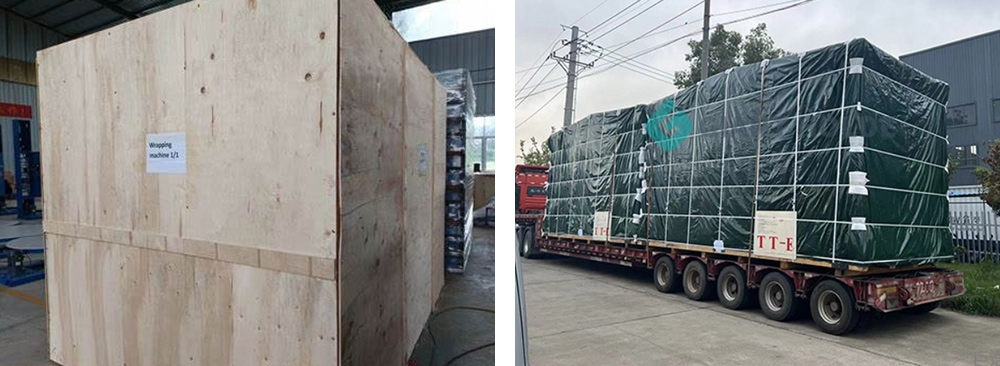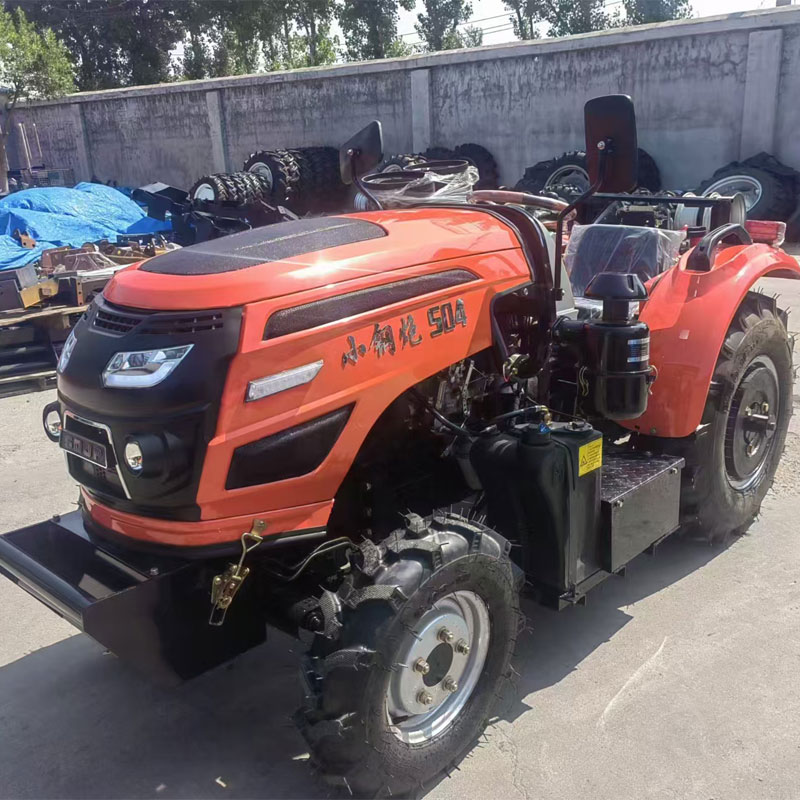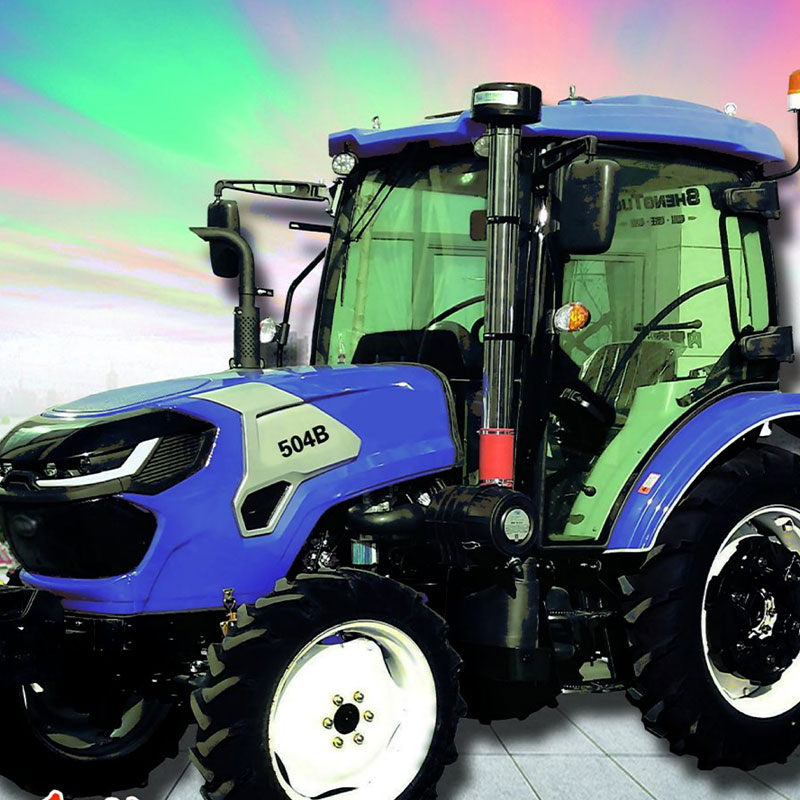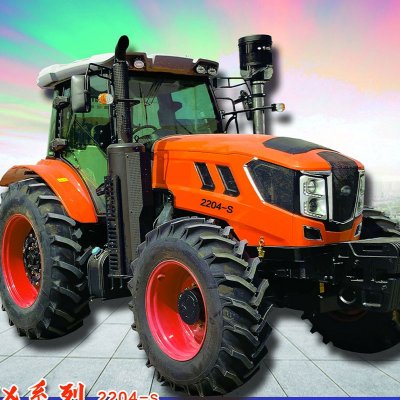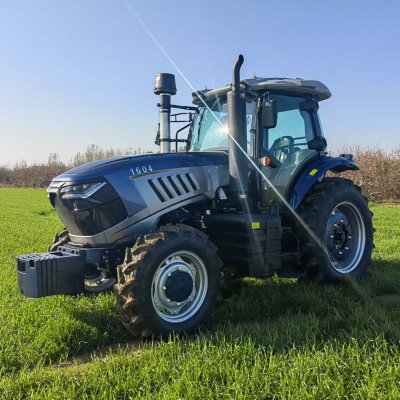70HP Wheeled Tractor
Efficient and labor-saving:
Wheeled tractors can significantly improve agricultural production efficiency, reduce labor input, and help farmers solve heavy farming activities. For example, in the cultivation, sowing, harvesting and other operations, wheeled tractors can quickly and accurately complete the task, greatly reducing the labor intensity of farmers.
Versatility:
Wheeled tractors have a variety of functions and can perform a variety of agricultural tasks, such as tillage, seeding, sprinkler irrigation, transportation and harvesting. This versatility enables wheeled tractors to play a greater role in agricultural production and meet the diverse needs of farmers.
Flexible to use:
The operation of wheeled tractors is relatively simple, and the driver can easily get started. At the same time, its tire design makes it easy for wheeled tractors to travel between all kinds of road conditions, whether it is flat farmland or country roads. This flexibility greatly increases operational efficiency and reduces constraints on the operating environment.
Uniqueness
70HP tractors belong to small and medium-sized agricultural machinery, with good flexibility, adaptability, and economy, mainly suitable for small and medium-sized farms or horticultural operations. Its uniqueness is reflected in the following aspects:
Flexibility and versatility:
The 70HP tractor has moderate power and is suitable for small and medium-sized agricultural operations, orchards, vegetable cultivation, and ranch maintenance. Its lightweight design makes it more flexible to operate in narrow spaces, especially suitable for orchards, greenhouses, and farms with complex terrains.
High fuel efficiency:
Compared to high horsepower tractors, 70HP tractors have lower fuel consumption rates, greatly reducing operating costs while meeting daily operational needs. It is particularly suitable for farmers with limited budgets, as it can provide sufficient power output while maintaining low operating costs.
Compact structure and easy maintenance:
The tractor is designed to be compact and easy to maintain. Its simple structure means that farmers can perform basic maintenance and repairs on their own, reducing reliance on professional maintenance and further lowering long-term operating and maintenance costs.
Driving comfort:
Although it is a small to medium-sized tractor, the cockpit of the 70HP tractor is still equipped with basic shock absorbers and comfortable seats, making it easy to operate and ensuring the comfort of the driver during long-term operations. This improves the user experience, especially suitable for long periods of repetitive work on small and medium-sized farms.
Economic cost
Purchase cost:
The purchase cost of a 70HP tractor is relatively low, making it suitable for farmers with limited budgets and small to medium-sized farmers. Its price is usually around 30-50% of that of high horsepower tractors, and the purchase threshold is relatively low, making it an ideal choice for users who do not need large machinery.
Fuel and operating costs:
Due to moderate horsepower and low fuel consumption, daily operating costs are relatively low. For farmers who work for a long time, this energy-saving design means lower long-term expenses, especially in the case of oil price fluctuations, where the economic performance of 70HP tractors is more prominent.
Maintenance and upkeep costs:
The tractor has a simple design, low maintenance difficulty, and requires minimal maintenance costs. Most accessories are reasonably priced, and farmers can usually replace some basic parts themselves, further reducing the cost of external maintenance services.
Long term economic benefits:
A 70HP tractor can complete various tasks at a lower cost, suitable for farming, sowing, fertilizing, transportation, and other tasks. Although its operational coverage area is relatively small, its good fuel efficiency and low maintenance costs mean that farmers can achieve good investment returns in various operations.
Market trends and policy drivers
Growth in demand for small and medium-sized farms:
With the increase of small and family farms, the market demand for 70HP tractors continues to grow. Small and medium-sized farms usually do not require equipment with super high horsepower. A 70HP tractor can meet their operational needs while having sufficient flexibility and ease of operation.
Upgrading agricultural mechanization:
Many countries are promoting the development of agricultural mechanization, and 70HP tractors have become the preferred choice for traditional manual labor farmers to move towards mechanization. Its moderate power and wide applicability make it an important component of mechanization upgrading, especially in underdeveloped areas.
Policy support and subsidies:
In the process of promoting agricultural modernization, the government usually provides subsidies and loan incentives to farmers who purchase small and medium-sized tractors. The 70HP tractor, with its compliance with environmental and energy-saving standards, can enjoy multiple policy supports to help farmers reduce purchase costs and accelerate the mechanization process.
Environmental regulations:
With the increasingly strict environmental regulations, emission standards are becoming more stringent. Modern 70HP tractors are equipped with low emission engines that comply with environmental standards such as Euro IV and Euro V, effectively reducing emissions and receiving government policy support.
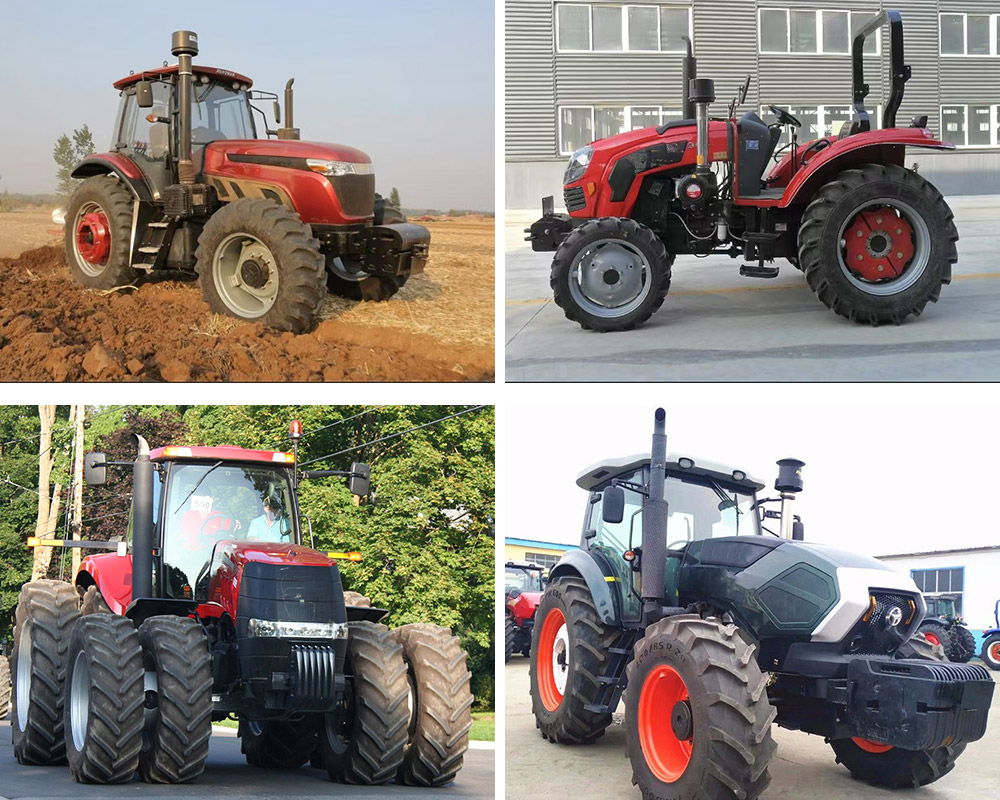
Application scenario
Small and medium-sized farmland cultivation:
The 70HP tractor is particularly suitable for small and medium-sized farmland, and can efficiently complete basic agricultural tasks such as plowing, sowing, and fertilizing. It is flexible and adaptable in the field, suitable for farms with smaller plots or complex terrain.
Orchard and Horticultural Homework:
Due to its compact design, the 70HP tractor is highly suitable for work environments that require high flexibility and maneuverability, such as orchards and vineyards. It can flexibly navigate between fruit trees and complete operations such as cultivation and spraying.
Greenhouse operation:
The size and power of this tractor are moderate, suitable for small-scale operations such as soil turning, fertilization, transportation, etc. inside or around greenhouses. Its flexibility makes it relatively easy to operate in narrow spaces.
Ranch and livestock breeding:
The 70HP tractor can be used for harvesting, packaging, and transporting grass in pastures, as well as for transporting livestock feed and supplies, making it suitable for the daily maintenance and production needs of small pastures.
Small scale soil remediation and transportation:
It can also be used for small-scale land consolidation projects, especially in rural infrastructure construction or field road paving. With its strong traction capacity, the 70HP tractor can effectively complete earthwork operations and transportation tasks.
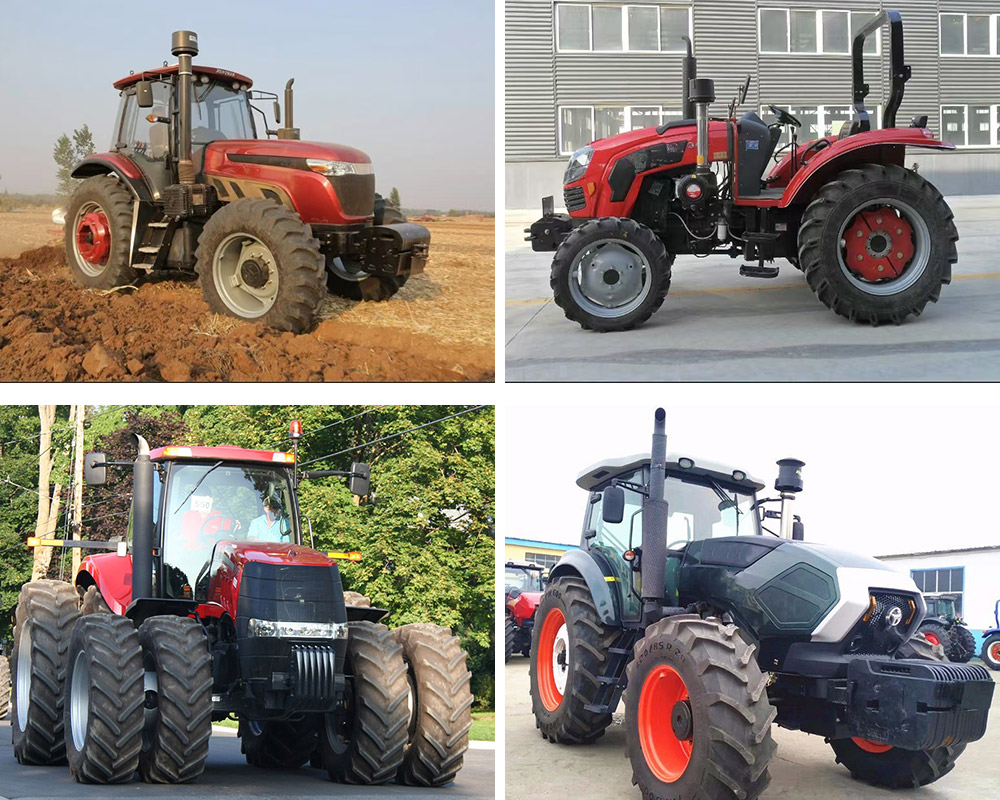
Packaging and Transportation
Packaging method:
Bare machine transportation: 70HP tractors usually use bare machine transportation, and the equipment will be fixed by steel brackets and ropes to ensure that there will be no displacement or vibration during transportation.
Frame packaging or wooden box packaging: For export or long-distance transportation, tractors will use frame packaging or wooden box packaging to ensure that they will not be damaged during transportation. Add shockproof, waterproof and other protective measures to the packaging.
Type of shipping:
Land transportation: For domestic transportation, 70HP tractors are usually transported by trucks or flatbed trucks. Due to the relatively small size of the equipment, transportation is more convenient and the cost is also lower.
Sea freight: For exports to international markets, 70HP tractors are usually shipped by sea in frame or wooden box packaging. Its compact size makes it suitable for long-distance transportation inside containers.
Transportation protection measures:
During transportation, critical components such as the engine, hydraulic system, and tires will receive additional protection to prevent damage caused by vibration, moisture, or climate change during transportation.
Installation and after-sales service:
After the tractor is delivered, on-site installation and commissioning services are usually provided to ensure that the equipment can be put into normal use. Manufacturers and distributors also provide technical support and after-sales maintenance to help farmers solve daily maintenance problems with their equipment.
